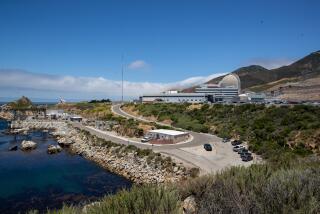Nuclear Safety First : Feds are wise to shut down Massachusetts nuclear plant
- Share via
Safety conservatives at the Nuclear Regulatory Commission won a round this week. On Tuesday, James M. Taylor, executive director for operations, recommended that the Yankee Rowe Nuclear Power Station, in Rowe, Mass., “be shut down until the NRC is satisfied that the . . . pressure vessel has adequate margins against failure during operation.”
A debate has reportedly been in progress at the NRC on the relicensing of aging nuclear plants. The conservative camp wants standards strictly enforced, and now it seems to be winning.
At 30 years old the nation’s oldest reactor, Yankee Rowe is up for renewal of its license in the year 2000. The Yankee Rowe situation has been widely watched as a clue to what might be in store for other reactors, particularly since last June when the Union of Concerned Scientists petitioned the NRC for an immediate shutdown. The union contended that Yankee Rowe did not meet the NRC’s own standards for reactor vessels.
In July the NRC granted Yankee Rowe an exemption from those standards subject to the plant’s submitting a plan for increasing the safety margin. In August the plant submitted its plan. But an NRC staff review of the proposal has now led to a recommendation--which, to its credit, Yankee Atomic Electric Co., the plant’s owner, has accepted--that the plant be shut down.
The reactor vessels of at least three other nuclear plants--at Point Beach, Wis., Turkey Point, Fla., and Ginna, N.Y.--also fall short of NRC standards for fracture strength. They should all be given the same strict review that Yankee Rowe has now received.
Energy needs and safety needs are obviously both legitimate, but we applaud the NRC for putting safety first. The duration of even a long-lasting energy shortage is short compared to the aftermath of a meltdown.
More to Read
Inside the business of entertainment
The Wide Shot brings you news, analysis and insights on everything from streaming wars to production — and what it all means for the future.
You may occasionally receive promotional content from the Los Angeles Times.










